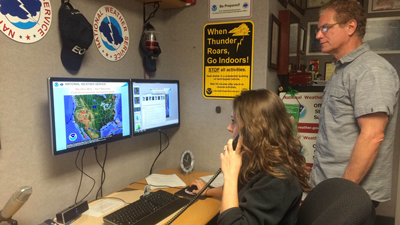Geographic Information Science (GIS) is a growing industry
April 27, 2016 | Matthew Schwartz, Chair, Department of Earth and Environmental Sciences | mschwartz@uwf.edu

The University of West Florida continues to expand our engagement of geographic information science (GIS) via new degree programs and certificates. GIS makes use of the spatial component of data to better analyze and understand any kind of information that relates to a location: transportation, forest ecology, archaeological, soil type, et al. By pairing geospatial concepts with cartographic principles and 21st century software, GIScientists are able to better answer the question, “where?”, and provide supporting evidence for the accompanying “why?” and “how?”.
While GIS does not necessarily require computers and software (indeed, the core methods of GIS date back to 19th century geospatial analyses of cholera epidemics in Europe), today’s practitioners are well served by remote sensing and geospatial software, including Esri’s ArcGIS software platform and open source GIS software, such as QGIS.
The US Department of Labor recognizes geospatial technology and its component GIS tools as a “High Growth Industry” that reaches across private and public employers. Recent UWF GIS students utilize their skills across the professional spectrum, from military applications through non-governmental organizations (NGOs), in the public realm as city planners, and into the private sector as drone data analysts. UWF GIS knowledge involves courses and practical experience in photo interpretation, remote sensing, cartography, computer programming, as well as a variety of GIS techniques and applications.
The UWF GeoData Center has offered both face-to-face and wholly online GIS Certificates at both the undergraduate and graduate level for nearly 10 years. Recently, the face-to-face Certificate has been spun out into a Minor in the Department of Earth & Environmental Sciences, the longtime home of GIS on UWF. A Geospatial Cybersecurity Certificate is now offered to undergraduate and graduate students as a collaboration with UWF Department of Computer Science. We have also expanded our graduate offerings to include the MS in GIS Administration degree, which is the first UWF program to have been granted Professional Science Master’s (PSM) designation by the National PSM Association. As result of these program additions, UWF is now able to offer a GIS education to students from high school through graduate school.
Over 200 students from around the world have earned undergraduate and graduate GIS Certificates from the UWF online GIS programs. We employ Virtual Desktops that allows students to access software and data directly from the UWF GIS Online program servers. Online students can learn from afar without needing to purchase and install complex GIS software suites. In recent years, our online program has begun offering a free six-week introductory GIS massively open online course (MOOC) to more than 5,000 registrants from around the world.
On the Pensacola campus of UWF, the GIS laboratory of the GeoData Center has been engaged in a number of outreach efforts, ranging from supporting the UWF Kugelman Honors program’s effort to apply Mehta’s Public Space Index to City of Pensacola parks to supporting UWF Alumni Affairs preparations for UWF’s upcoming 50th anniversary celebrations, all while providing the latest technology to students in the BS and MS programs from the Departments of Earth & Environmental Sciences, Biology, Anthropology, and others!
Practical application of GIS skills is a core concept of the various GIS programs at UWF. In the PSM degree, all students are required to complete a two-term capstone sequence under the mentorship of both a professor and a professional non-academic “client”, while all Minor and Certificate students are eligible to pursue an internship in the public or private sectors. These experiences are important opportunities for students to demonstrate their content knowledge and skills by providing solutions to real-world problems and questions.







